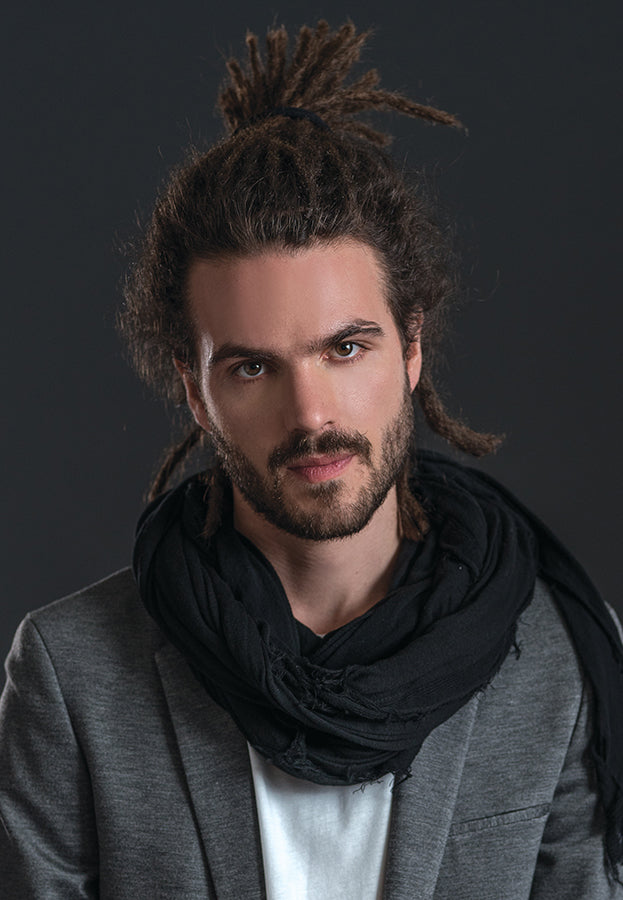The Creative Playfulness of His Own Accord
Once a staple of the late 1990s European nightclub scene, French house music, which was popularized by the likes of Daft Punk and Bob Sinclar, lost much of its traction in the mid-2000s as musical trends and tastes changed. But now, after a decade of being virtually absent from the music charts, this style of house is once again turning heads and capturing the attention of both music lovers and partygoers all over the world. And at the center of this musical revival is this 28-year-old artist known as French Kiwi Juice, or FKJ for short.
 FKJ – real name, Vincent Fenton – has been one of the pioneers of the new French house movement, thereby cementing himself as an artist to look out for. Born and raised in the city of Tours, in central France, Fenton’s first real experience with music was him playing around with the plastic keyboard that his sister had gotten for Christmas. He then went on to mess around with the guitar, his first real instrument, which eventually inspired him to fully learn how to play not only it, but also a handful of other instruments, such as the piano, the saxophone, the synthesizer and the drum machine – all without the guidance of a music teacher. By his late teens, he was already a proficient autodidactic multi-instrumentalist who composed his own songs and uploaded them on SoundCloud – even though he didn’t know how to read music. But what distinguishes him from other artists is not the fact that he is self-taught, or his ability to play different instruments and compose engaging melodies without using a music sheet, but rather his approach to learning how to play those instruments, and how to make music without adhering to external pressures or expectations beyond his own desire to explore and entertain himself. “I was doing what I wanted. I only did the playful things, not the boring things,” he says. “The key really is the playfulness.”
FKJ – real name, Vincent Fenton – has been one of the pioneers of the new French house movement, thereby cementing himself as an artist to look out for. Born and raised in the city of Tours, in central France, Fenton’s first real experience with music was him playing around with the plastic keyboard that his sister had gotten for Christmas. He then went on to mess around with the guitar, his first real instrument, which eventually inspired him to fully learn how to play not only it, but also a handful of other instruments, such as the piano, the saxophone, the synthesizer and the drum machine – all without the guidance of a music teacher. By his late teens, he was already a proficient autodidactic multi-instrumentalist who composed his own songs and uploaded them on SoundCloud – even though he didn’t know how to read music. But what distinguishes him from other artists is not the fact that he is self-taught, or his ability to play different instruments and compose engaging melodies without using a music sheet, but rather his approach to learning how to play those instruments, and how to make music without adhering to external pressures or expectations beyond his own desire to explore and entertain himself. “I was doing what I wanted. I only did the playful things, not the boring things,” he says. “The key really is the playfulness.”
Although he never thought that he would have a career as a musician – he actually studied sound engineering and cinema in Paris and pursued music on the side “for my own pleasure” – he soon got involved in the Parisian club scene as a DJ. “I thought to myself, ‘I can share my music,’ and soon it became full-time,” recalls Fenton, who managed to not only launch his undoubtedly successful career, but also contribute to the re-emergence of French house music, thanks in no small part to the complex and dynamic nature of his musical arrangements. “My music is kind of like a melting pot,” he says, having been greatly inspired by the old jazz, blues and rock records that he grew up listening to. But despite his contributions to the so-called new French house genre, he never set out to make music in that category. “It’s just what people call it, I never said I was going to fit into that box. I’m just doing whatever fits my mood,” he affirms. And as his mood seems to be ever-evolving, he also ventures into genres like neo-soul, nu jazz and electronic. Indeed, his self-titled debut album French Kiwi Juice is almost entirely neo-soul. Probably because of his independent streak, his wish to do music the way that he wants and he himself finds personally pleasurable and fulfilling, fame and success have not erased Fenton’s desire to keep improving his art on his own terms. “It’s really not about the fame because I’m not looking for that,” he shares. “I’m already happy professionally. Now what I want to do is to learn more, learn for myself. I don’t want to stagnate – I want to keep pushing.”
Writer: Monica Dias
Photographer: Adam Rowell
Stylist: Amy Davis
Men’s Grooming: Kimm DiCato
Videographer: Aaron Martin
Editor: Eiko Watanabe
Special thanks to MishMash (@mishmashsd - www.mishmashsd.com) & Matti D (@mattidstyle - www.mattidstyle.com) & HUGO (@hugo_official - www.hugoboss.com) & EPK Media (@myepk & @epkmedia - epkmedia.com)

